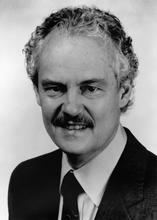
Funds Enterprise Gets New Name to Honor Former Dean
Wednesday, September 19, 2018
Two decades ago, under the leadership of then-Dean David Kidwell, the Funds Enterprise was created, becoming the first of the Enterprise programs established at the Carlson School.
Today, there are four different Enterprise programs, which allow students to address real-world challenges for real businesses. These experiential learning experiences are now the hallmark of what makes a Carlson School MBA degree one of the best in the world.
In celebration of the Funds Enterprise’s success in its first 20 years, the program was renamed the David S. Kidwell Funds Enterprise to honor the visionary leadership of the former dean who helped found the program.
“We are honored to be recognizing Dean Kidwell in this way,” Funds Enterprise Managing Director Susanna Gibbons says. “He had a profound impact, not only on the Carlson School, but on every student who gets the chance to take these experiential learning classes. These programs have the ability to change student’s lives and prepare them to shape the future of business.”
The Funds Enterprise is now regarded as one of the most successful student-managed investment funds in the country, and, with an asset total of approximately $40 million, one of the largest. The newly renamed Kidwell Funds Enterprise consists of two funds managed by students, the Carlson Growth Fund and the Carlson Fixed Income Fund.
Students work with real participants who have invested real money in the fund. Partners comprise some of the world’s leading financial firms, including Allianz, Ameriprise, Federated Insurance, Piper Jaffray, Securian, Thrivent, U.S. Bank, and Wells Fargo .
By managing these funds, MBA students and select undergraduates get a unique learning opportunity to make real, live investment decisions before entering the workforce. Enterprise programs, such as this one, are important to students because they allow them to take what they learn in the classroom and apply it to a real scenario.
“There’s nothing like sitting down and trying to make a decision with the theory you learned,” Gibbons says. “Making these decisions is hard, and oftentimes there is no right answer. What we’re trying to give them is an ability to connect theory to action while they’re still here instead of at their very first job. Because at their first job, it can be really stressful.”
Students inherit the portfolio from the previous semester, and must work alongside their clients to manage all aspects of the funds, including analysis of securities, trading, compliance, marketing, and client reporting.
Being able to work with those real clients in one of the country’s leading financial centers gives Carlson School students a built-in advantage to network and develop relationships with area investment professionals.
That partnership and support students get from investors, mentors, and the advisory board is what Gibbons is most proud of from the program’s first two decades.
Today, more than 500 alumni work in investment management, corporate finance, investment and commercial banking, private equity, and investment research on the buy and sell side, locally and nationally.
“We would not be successful without all of these different groups of people coming together and continuing to support the program,” she says. “The school should be really proud that it created a true community partnership.”
